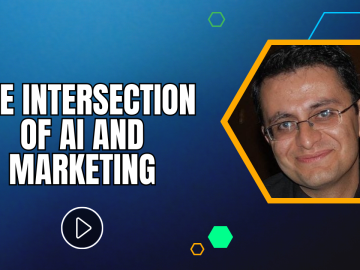In a United Airlines control center over the Fourth of July weekend, customer service agents hunkered down alongside their flight operations colleagues — ready, at a moment’s notice, to alert travelers with a text or email of any flight changes.
With a company record 5 million passengers set to take to the skies over the four-day holiday weekend, it was no small task — but one made easier with the aid of generative artificial intelligence, which United announced last week that it has integrated in its
customer outreach operations..
“We know customers appreciate transparency,” United’s chief information officer Jason Birnbaum said, “and by combining innovative technology-enabled tools with people power, we can give more people, even more in-the-moment details about their flight.”
While airlines have always relied on technology to work through tough situations, generative AI is making it even easier in a host of different ways, said Garry Wiseman, chief product and technology officer of Sabre, a global distribution systems provider for airlines.
“AI is having a significant impact across many airline industry processes from flight scheduling and optimization to revenue management, reservations and ticketing, to operations and maintenance optimization,” Wiseman said.
Get a dose of digital travel in your inbox each day
Subscribe to our newsletter below
The AI boost comes at a crucial time.
“The airline industry is challenged. We all know that,” said Birnbaum with United, whose updates now include real-time weather radar maps to help customers understand how inclement weather in one part of the country can affect flights elsewhere. “There are storms, there are … disruptions you can’t avoid it.”
While speaking at an industry event last month, Birnbaum elaborated on the ways generative AI can simplify running an airline with a hypothetical scenario in New York’s airspace.
“The air traffic controller will call and say ‘Hey … you thought you’re landing 60 planes an hour. Guess what? You’re only going to land 20. You tell us which 20 you want to land in the next hour or two hours or three hours.”
Finding a solution requires balancing many variables: customers on connecting flights, which crews are on board and where they are headed next. The list goes on — too long for most humans, who wind up making “suboptimal decisions,” Birnbaum said.
Which is just where generative AI can help.
Generative AI’s impact on airlines
Airline industry leaders and partners are looking at a number of key areas in which generative AI can propel the industry forward – or smooth current processes.
Eric Léopold, founder of aviation consultancy Threedot, recently conducted a study on generative AI usage by 15 airlines with a group of graduate students at Cranfield University. While the study is not public, he shared some of the findings.
“The three main use cases identified in the study leverage GenAI’s ability to understand, summarize and generate text (in natural language) and include: digital customer assistant (commercial), incident report and root cause analysis (operational), reduction of manual reconciliations (support),” said Léopold.
“Almost all key processes will be impacted by AI, some sooner, others later,” said Olaf Backofen, head of global retail partnerships for Lufthansa Group, noting he sees innovation as a current focus with benefits in efficiency and how airlines are serving customers.
Backofen also cited dynamic pricing, revenue optimization, crew scheduling, demand forecasting, route optimization and baggage handling as areas with room to benefit from the technology.
Almost all key processes will be impacted by AI, some sooner, others later.
Olaf Backofen – Lufthansa Group
“I see that the biggest potential is on the customer front for the generative AI use cases,” said Antti Kleemola, chief information officer and executive board member at Finnair.
Kleemola nodded to assisting and servicing customers in a better, more personal manner starting with booking and running through the passenger journey – including disruption management, staff connection and more.
“The second big area is software development,” Kleemola continued, pointing to use cases for supporting customers and internal users. “Here the change will be in productivity and also in innovation capability as more and more people become citizen developers with the help of GenAI.”
Already, Finnair is implementing multilingual customer support with the help of generative AI, giving travelers the ability to interact with agents whose own language is different from theirs.
Sabre’s Wiseman said the company is looking at generative AI potential and current impact on the airline industry in three contexts including productivity, customer service and innovation.
Chris Branagan, chief technology officer at IBS Software, which provides SaaS solutions for airlines, had a similar outlook on generative AI.
“It’s got great potential to have a really positive impact … for the operation of an airline, and also the customer experience with an airline,” said Branagan.
Branagan pointed to tools for airline agents to simplify their jobs – including those capable of identifying the next best option to help with customer service – and believes generative AI can take customer service further still with chatbots.
“Chatbots should be able to deal with an awful lot of the questions coming to an airline,” said Branagan. “I can see that in the future if there’s a problem at an airport … chatbots should be able to combine sources of information and media to be able to get people a real-time perspective of what’s going on. Which is often going to be quicker than the airport or the airline being able to update their own platforms.”
He predicts information will come from a combination of sources including social media feeding into generative AI – which could result in “richer information closer to the event.”
Branagan also believes generative AI will make an even bigger difference thanks to recommendation engines for vacation inspiration – where it is already making an impact.
“AI systems can generate customized offers and promotions based on real-time analysis of passenger data, such as suggesting upgrades, lounge access or travel insurance that align with the traveler’s preferences,” said Lufthansa’s Backofen.
And while plenty is being explored, some say progress is likely to be slower than anticipated – even if every player in the space is interested.
“I would say every airline is looking into how they can leverage AI,” said Cole Wrightson, chief product officer at FLYR, which provides AI-powered revenue management systems and optimization tools for airlines.
“But I think we’re very early in the cycle of actual use cases where we’re pushing the needle forward,” he continued. “There’s a lot of this kind of early ‘gold rush’ trying to figure out where there actually is value and how things that have worked in other applications can be meaningfully deployed at airlines or in other travel areas.”
And it’s not necessarily easy to gear existing legacy airline systems toward generative AI adaption, Wrightson said.
“The technology infrastructure that airlines have … is very constraining in terms of their ability to use these techniques because … they aren’t able to access the data or sort of bring various data pieces together,” he said.
The next 3 to 5 years
Generative AI has already prompted a good amount of excitement and innovation. Industry leaders have some predictions for how the technology will be used going forward.
“GenAI will [continue to] revolutionize the airline industry as [in] almost all parts of our life,” said Backofen. “It will help to provide new [customer] services and further increase efficiency. A joint approach with our partners is crucial”
Sabre’s Wiseman looked back before looking ahead.
“If you consider that ChatGPT or Gemini were unheard of three years ago, then it’s incredible to think about where we might be in the next three years,” said Wiseman. “You can expect to see the increasing adoption of AI-powered technology by airlines, with the focus on modular, next-gen solutions that are platform agnostic and can be adapted to suit an individual airline’s business strategy and pace of change.”
Léopold had a more specific trajectory in mind. In the next three or so years, he anticipates generative AI will be implemented, tested, assessed and deployed so all employees and customers are using it. That will prompt robust changes to processes and procedures – Léopold expects airlines to become more efficient, for the customer experience to be smoothed even when it comes to disruptions, which he believes are likely to ramp up with climate change.
And even with that in mind – it’s hard to know, he said what things will look like in such a short period seeing how far generative AI has come in a year and a half or so.
“The progress is just going to be augmented in the next three years,” said Léopold. “We just don’t know the next step of GenAI. Actually, it’s not containerized, it’s going to be a different kind of AI.”
AI, Léopold surmised, could theoretically make breakthrough discoveries no human being has been able to achieve, like a cure for cancer or how to decarbonize aviation or how to create fuel from the sun using nuclear power. “We live in exciting times.”
Balancing human and AI capabilities
There’s been widespread chatter about whether generative AI could replace humans in many industries across the globe as the hype continues around the new technology.
In the airline space, the technology could change the characteristics airlines seek in employees, without replacing the need for real workers.
“Airlines are already placing more emphasis on the technological transformation required to remain top of mind for passengers in the competitive aviation landscape, and that is creating a shift towards a workforce with a more balanced and forward-thinking skill set,” said Sabre’s Wiseman. “While more repetitive tasks will be automated, human skills such as critical thinking, creativity and emotional intelligence are more important than ever.”
He believes the industry will see a bump in the need for certain skills as more and more routine tasks can be handled by AI. For example, there may be more demand for AI data scientists and employees to fill human-centered customer service roles.
“The overall focus will likely shift toward a more tech-savvy workforce with a strong blend of human and AI capabilities and a willingness to constantly learn to keep pace with the evolving landscape.”
Backofen believes new job profiles will be needed. An airline, for example, might seek a generative AI expert with knowledge on AI marketing as opposed to a marketing or IT expert.
“Hence, a transformation is needed to adapt existing positions,” said Backofen, referencing furthering skills needed by employees. “[Generative AI] helps to support us humans, spend less time in searching [for] information and do repetitive tasks but more in listening to customer[s] and communicat[ing].”




